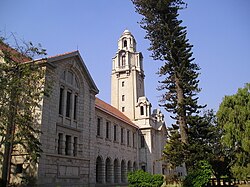| Rank | University Name | University Type | NIRF Rank | Notable Affiliated Colleges |
|---|
| 1 | Indian Institute of Science (IISc), Bengaluru | Institute of National Importance | 1 | N/A (IISc is a standalone institution) |
| 2 | Manipal Academy of Higher Education, Manipal, | Deemed University | 4 | Manipal Institute of Technology (MIT), Manipal – NIRF Engineering Rank 56 |
| 3 | JSS Academy of Higher Education and Research, Mysuru | Deemed University | 24 | JSS Medical College, Mysuru |
| 4 | Visvesvaraya Technological University (VTU), Belagavi | State Public University | 47 | Numerous engineering colleges across Karnataka, including B.M.S. College of Engineering, Bengaluru |
| 5 | University of Mysore, Mysuru | State Public University | 54 | Maharaja's College, Mysuru; St. Philomena's College, Mysuru |
| 6 | Christ University, Bengluru, | Deemed University | 60 | Christ College, Bengaluru |
| 7 | NITTE University,Mangalore | Deemed University | 66 | KS Hegde Medical Academy,NMAMIT |
| 8 | National Institute of Technology Karnataka (NITK), Surathkal | Institute of National Importance | 67 | N/A (NITK is a standalone institution) |
| 9 | Yenepoya University, Mangaluru | Deemed University | 95 | Yenepoya Medical College, Mangaluru |
| 10 | Alliance University, Bengaluru | Private University | 98 | Alliance School of Business, Alliance College of Engineering and Design |
| 11 | Jain University, Bengaluru | Deemed University | 100 | Center for Management Studies, School of Engineering and Technology |
|
